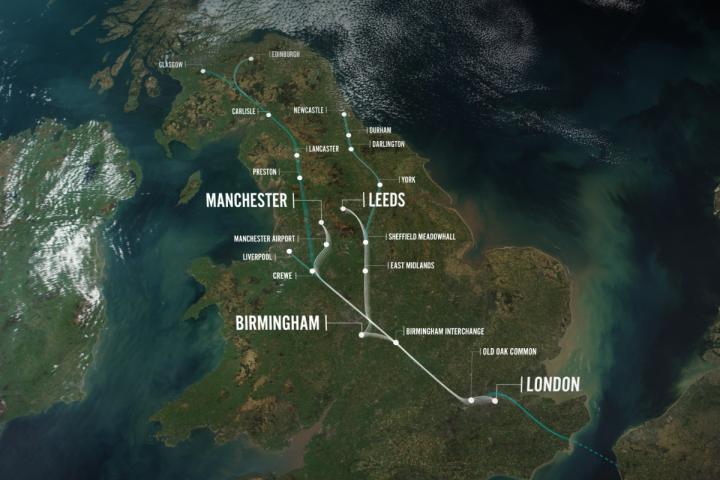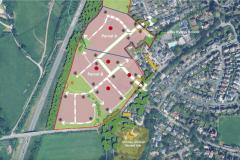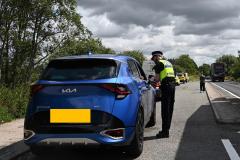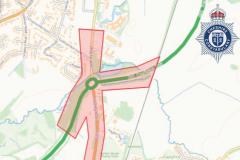
The government has unveiled proposals for the second phrase of the controversial £32 billion HS2 high-speed rail network which is designed to cut journey times between cities and boost regional business.
The preferred route for the second Y-shaped phase runs northwards from Birmingham and will have stops at Manchester Piccadilly and Manchester Airport. The high-speed trains will also stop at Toton in the East Midlands Sheffield and Leeds.
There had been speculation that the high-speed trains might pass through Wilmslow and Alderley Edge however it has been revealed today that, whilst the route will pass through the Tatton constituency, the nearest stop will be the new airport station.
It will be located only a few miles outside Wilmslow, between Junctions 5 and 6 of the M56, and enable passengers to reach London in less than an hour.
HS2 trains will pass through Crewe, where a connection with the West Coast Main Line will be provided just south of Crewe, with the main line continuing in a tunnel under the town heading north. It will then cross over the M6 just north of junction 19, heading past Mere and High Legh before crossing the M56 to the airport station, located between Warburton Green and Davenport Green.
Heading north from the airport the line will enter a seven-and-a-half-mile tunnel, surfacing a short distance from the new station alongside the existing station at Manchester Piccadilly.
High speed trains will travel up to 225mph when the lines first open, with the potential to increase this to 250mph which is is faster than the French TGV and Japanese bullet train.
Journey times between Manchester and London will be slashed from two hours and eight minutes to one hour and eight minutes whilst those travelling from the new interchange station at Manchester Airport will reach London in fifty-nine minutes.
HS2 will also provide high capacity services for passengers with up to eighteen trains per hour, each carrying up to 1,100 passengers.
The Department of Transport has said that the project, which is expected to cost £32.7 billion, will support the creation of 29,700 jobs, as well as 3,100 houses, at the new station in Manchester city centre and 300 jobs at the Manchester Airport station.
Council Leader Michael Jones said today: "This is great news for Cheshire East and for Crewe in particular. This decision firmly demonstrates the government's belief in Crewe and puts Crewe firmly at the centre of the North West's growing economy. HS2 consolidates Cheshire East at the most connected area in the UK.
"Your MPs George Osborne, Edward Timpson and I, have fought hard to keep the line away from Knutsford and Tatton, which we have been successful in achieving. Throughout the process we raised concerns about the line of route and raised the profile for a common sense solution, which I believe we have achieved.
"I will continue this fight to ensure we continue to get the best deal for all the people of Cheshire East.
"This is great news for the 44,000 people who live in Cheshire East and own a business in the area and beyond. It is great news if you are seeking to invest.
"We already have international companies such as Waters and AstraZeneca, who have chosen to come here and expand their operations, and this news today reinforces the fact that Cheshire East is open for business
"The history of HS2 was that it was always coming to Manchester and to the airport and as a result of today's announcement our industries will gain from the airport station, allowing our companies and residents accessibility to London via the airport in an hour.
"Those living in the north of the Borough will also benefit from much-improved road and rail access to Manchester Airport.
"High Speed 2 is fantastic news for most of our residents. However, as we celebrate the news for Crewe, we should also strive to ensure any disruption is minimised and also that our beautiful land in Cheshire East is protected.
"I will work hard to minimise the impact along the proposed route and ensure that residents, businesses and landowners affected will receive the appropriate compensation in a timely manner. I will also be working hard to ensure that the environmental impact along the new line is minimised.
"I will now continue to lobby hard for a new dedicated HS2 station at Crewe in the tunnel directly under the existing station, creating a fully-integrated hub station between HS2 and the existing Rail network. This solution would provide even greater connectivity for Crewe, Cheshire East and the whole of the North West and North Wales, with a focus on a much wider range of destinations.
"The estimated cost of a hub station at Crewe is £200m. The cost for UK plc of not doing this – as a result of the loss of economic performance and social costs in areas such as North Wales, Stoke and Liverpool – could be as much as £2 billion. I will be developing this argument strongly as part of our process of active lobbying for the new station.
"With this 360 degree connectivity secured, I believe that we will have then achieved the maximum economic benefits for UK plc and for the local people and businesses of Cheshire East."
The government and HS2 Ltd will work with MPs, local authorities and station city delivery partners, as well as environment and heritage organisations, to refine these proposals.
A consultation on the preferred route, stations and depots will begin later this year and final route will be chosen by the end of 2014.
Click here to view maps of the proposed route.
Further information can be found at www.hs2.org.uk.
Updated: 23.48pm, Tuesday 29th January.
Cheshire East Council has issued the following today statement today:
"In a press release issued yesterday (January 28) Cheshire East Council stated that George Osborne had fought hard to keep the HS2 rail link out of his constituency in Knutsford and Tatton.
In fact, this is not the case and MP George Osborne had no say whatsoever over the proposed route of the HS2 link. We are happy to set the record straight."






Comments
Here's what readers have had to say so far. Why not add your thoughts below.
And why do we have to wait 20 years for it? With spare capacity in the construction industry and the economy in the doldrums, now is the time to invest in the nation's infrastructure.
This is a project of vision, the sort of enterprise our confident Victorian forebears would be proud of! We need it for reasons of rail capacity alone, the reduced journey times and economic benefit to our area being a bonus. I only hope future politicians are brave enough to make it happen.
It's a huge amount of money and it saddens me to think of the countryside that will be lost.
With the huge amount of new homes just waiting to be built on almost every spare piece of land up and down the country and now this..........
The task for local councillors is to fight for the right infrastructure in this area; we will be the only area with an actual station and an actual airport on our doorstep.
This is not a competition about our area versus another area; but it is about maximising the strengths of our area, and an airport and an HS2 hub are incredible strengths.
Regarding the choice of route, it may not be the most direct possible but in largely following the noise footprint of the existing West Coast Main Line and the M56 it minimises environmental impact on unspoiled countryside.
The cost will escalate out of control - it always does - but we need to get on with this a run up the west of the uk to Glasgow and to Edinburgh in the East.
This will be excellent for the region - i look forward to using OAP tickets to ride HS2 just for fun :-))))
The Mythology Surrounding The Building and Opening of the HS2 Rail Line Northern Extension
We are reliably told by politicians, business leaders, Trade Unions, forecasters etc that the building of a high speed rail link between the North of England (and the Midlands) will rebalance the regional basis of the economy and help revitalise the Regions. I do not know who wrote that script, but it is worthy of Eddie Braben or the Monty Python Team.
The rise of commuter towns outside London came about, mostly, by the accessibility of the capital by fast train journeys such as those from Brighton (60 minutes or so for the last 100 years), Surrey, Sussex, North Hampshire, Essex, and the so-called Home Counties then widening to places such as Peterborough etc. Witness also the impact of the HS125 from Bristol which heralded the “long-distance” commuting from the Bristol area in the late 1970’s. The advent of a 60-70 minute or so journey time from Manchester or Leeds/Sheffield, for example will mean that the Greater Manchester/Leeds/South Yorkshire areas will become potential commuter areas for London. In the same way that reduced journey times from South Birmingham will do so for that part of the country.
The experience of high speed rail links such as the French TGV saw service industries in Paris no longer requiring local or regional offices to service outlying regions of France as companies in Paris etc could easily get in touch with companies in Lyon or even Marseille or Nice. The same has been seen in Germany and Japan.
Whilst it is true that the North has declined in its fortunes economically, one might remember that this has been concurrent with the journey times to London reducing. Please recall that at the peak of the industrial might of the UK, the journey times between the capital and the industrial North and Midlands were measured in terms of 5-6 or 3-4 hours respectively in the 1920’s to the 1940’s.. The net result of the HS2 high speed links will be to ensure that London is a greater “magnet” for business to locate there and there alone and thus service any business some 200 miles or more away. If there is a demand for high speed links, then why are the current connections working at 80%+ capacities? Is there a real need for fast(er) journey times? In addition, why do they not use flight connections to London City Airport and/or other airports near London City centre? I would further suggest that given the fact that on trains today we can access WiFi and use mobile telephones to conduct business (if you do not believe me listen to what is being said on any typical long(ish) train journey; the needs of businesspeople is served by existing services. In addition to which you can work not from battery, but being charged and powered from sockets adjacent to the seats. Is the need really for more services, not faster ones?
In the long-term (15-20 years), my advice to investors would be to buy house-building land in the south of Greater Manchester and certainly the south of Birmingham and build commuter homes for those who will work in London. You will find that the “value” of houses and housing land there will increase exponentially with the advent of such a rail link.
The “experts” say this rail link will revitalise the economy despite the fact that we are looking at a 20-year time frame. I am mindful of the old saying that the main reason Economic forecasters to exist is to make Weather forecasters look good.
Of course for some it might come too late with a possible meteoric rise in property prices.
The speed of HS2 will be a bonus. The major driver is the lack of expansion capacity on the current creaking Victorian network, for freight as well for passengers. More services can only come if there is more capacity. The West Coast Main Line has few if any free paths today at busy times, never mind in 20 years from now. And the trains and stations have just been extended to the maximum length the infrastructure can handle - 11 coaches.
We've tried fiddle faddling about with the existing West Coast Main Line; it cost £9B, getting on for a third as much as HS2 will, caused chaos for passengers while the work was carried out and gave very poor return on investment. A new rail line is the only answer, and it'd be daft to build one that isn't to the latest continental high speed standards.
HS2 will be the rail equivalent of the M6 and M1 - can you imagine road travel today if all we had was the non-motorway road system? We built those motorways back in the '50s and '60s, but it'll be at least another couple of decades before we see HS2; that's the problem with it! We need it now! Even if it was up and running today we'd still be decades behind most of the rest of Europe, not to mention Japan and China!